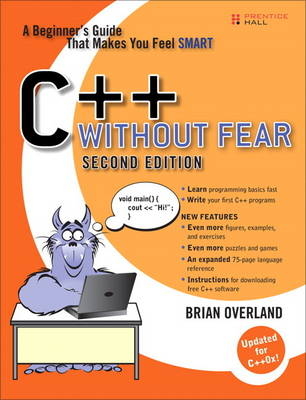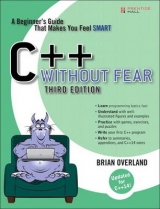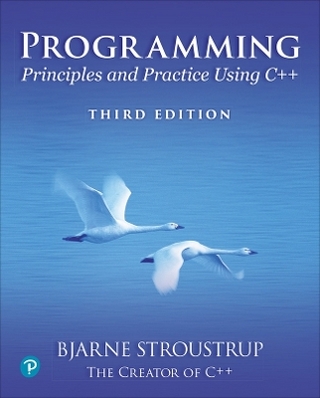
C++ Without Fear
Prentice Hall (Verlag)
978-0-13-267326-6 (ISBN)
- Titel erscheint in neuer Auflage
- Artikel merken
Written with the same approach that earned the first edition rave reviews, the author first emphasizes short, simple examples that are easy to enter; then, within a couple of chapters, he has you creating useful utilities, playing games, and using the computer to solve interesting puzzles. His approach is a welcome departure from many programming texts, which quickly get bogged down in complex and sometimes meaningless examples. You’ll find here, patiently explained and clearly illustrated, everything you need to learn programming quickly, and to have fun doing it!
Yes, programming can be a complex task, and C++ is a language often used by professionals. In fact, many of the coolest games, graphics, and Internet applications are created with C++, and it’s even been used on the Mars rovers. But the language, like the monster pictured on the cover, need not be all that fearsome. Broken down to its essentials, and enhanced by simple examples, practical exercises, and the whys and tricks behind each language feature, you’ll be amazed at the rapid progress you can make.
With C++ Without Fear, Second Edition, you will
Learn the basics of C++ programming
Get started writing your own programs
See how and why each piece of a program does what it does
Create useful and reusable program code
Understand object-oriented programming–for once explained in simple, down-to-earth terms
NEW AND IMPROVED
While compatible with nearly every version of the C++ language, this second edition has been updated to cover important features of the newest and greatest C++ standard (C++0x). In addition, it now includes
Even more figures, examples, and exercises
Even more puzzles and games
An expanded 75-page language reference
Instructions for downloading free C++ software
Whether you wish to learn C++ programming for pleasure, or you’re considering a career in programming, this book is an outstanding choice.
Brian Overland has professional experience as a programmer on large commercial projects, as an author of six books, and as a teacher of programming. At Microsoft, he was a programmer, writer, and manager, winning several awards for writing. He’s been involved with several hi-tech start-ups since then. When not programming or writing programming books, Brian is an actor and novelist.
Preface xxiii Acknowledgments xxix
About the Author xxxi
Chapter 1: Your First C++ Programs 1
Thinking Like a Programmer 1
What’s Different About C++? 7
Building a C++ Program 8
Installing Your Own C++ Compiler 10
Advancing to the Next Print Line 16
Storing Data: C++ Variables 19
Introduction to Data Types 20
A Word about Variable Names and Keywords 28
Chapter 1 Summary 30
Chapter 2: Decisions, Decisions 33
But First, a Few Words about Data Types 33
Decision Making in Programs 34
Introducing Loops 43
True and False in C++ 50
The Increment Operator (++) 51
Statements vs. Expressions 52
Introducing Boolean (Short-Circuit) Logic 53
Introducing the Math Library 57
Chapter 2 Summary 64
Chapter 3: The Handy, All-Purpose “for” Statement 67
Loops Used for Counting 67
Introducing the “for” Loop 68
A Wealth of Examples 70
Compound Statements (Blocks) with “for” 74
Declaring Loop Variables on the Fly 74
Comparative Languages 101: The Basic “For” Statement 79
Chapter 3 Summary 80
Chapter 4: Functions: Many Are Called 83
The Concept of Function 83
The Basics of Using Functions 85
Local and Global Variables 93
Recursive Functions 95
Games and More Games 113
Chapter 4 Summary 115
Chapter 5: Arrays: All in a Row... 117
A First Look at C++ Arrays 117
Initializing Arrays 119
Zero-Based Indexing 119
Strings and Arrays of Strings 128
A Word to the Wise 141
2-D Arrays: Into the Matrix 142
Chapter 5 Summary 143
Chapter 6: Pointers: Getting a Handle on Data 145
What the Heck Is a Pointer, Anyway? 145
The Concept of Pointer 146
Declaring and Using Pointers 148
Swap: Another Function Using Pointers 155
Pointer Arithmetic 161
Pointers and Array Processing 163
Chapter 6 Summary 168
Chapter 7: Strings: Analyzing the Text 169
Text Storage on the Computer 169
It Don’t Mean a Thing If It Ain’t Got That String 171
String-Manipulation Functions 172
Reading String Input 178
Individual Characters vs. Strings 185
The New C++ String Type 189
Other Operations on the string Type 193
Chapter 7 Summary 194
Chapter 8: Files: Electronic Storage 197
Introducing File-Stream Objects 197
How to Refer to Disk Files 199
Text Files vs. “Binary” Files 206
Introducing Binary Operations 208
Chapter 8 Summary 217
Chapter 9: Some Advanced Programming Techniques 221
Command-Line Arguments 221
Function Overloading 227
The do-while Loop 230
The switch-case Statement 232
Multiple Modules 234
Exception Handling: I Take Exception to That! 237
Chapter 9 Summary 240
Chapter 10: New Features of C++0x 243
Overview of C++0x Features 243
The long long Type (not long long long) 244
Range-Based “for” (For Each) 256
The auto and decltype Keywords 261
The nullptr Keyword 262
Strongly Typed Enumerations 263
Raw String Literals 273
Chapter 10 Summary 273
Chapter 11: Introducing Classes: The Fraction Class 277
Object Orientation: Quasi-Intelligent Data Types 277
Point: A Simple Class 279
Private: Members Only (Protecting the Data) 281
Introducing the Fraction Class 286
Inline Functions 289
Find the Greatest Common Factor 291
Find the Lowest Common Denominator 292
Chapter 11 Summary 305
Chapter 12: Constructors: If You Build It… 307
Introducing Constructors 307
Multiple Constructors (Overloading) 309
C++0x Only: Initializing Members within a Class 309
The Default Constructor–and a Warning 310
C++0x Only: Delegating Constructors 313
C++0x Only: Consistent Initialization 314
Reference Variables and Arguments (&) 321
The Copy Constructor 323
A Constructor from String to Fract 329
Chapter 12 Summary 331
Chapter 13: Operator Functions: Doing It with Class 333
Introducing Class Operator Functions 333
Operator Functions as Global Functions 336
Improve Efficiency with References 338
Working with Other Types 348
The Class Assignment Function (=) 349
The Test-for-Equality Function (==) 350
A Class “Print” Function 351
C++0x Only: User-Defined Literals 357
Chapter 13 Summary 360
Chapter 14: Dynamic Memory and the String Class 363
Dynamic Memory: The “new” Keyword 363
Objects and “new” 365
Allocating Multiple Data 366
Introducing Class Destructors 370
“Deep” Copying and the Copy Constructor 376
The “this” Keyword 378
Revisiting the Assignment Operator 379
Writing a Concatenation Function 380
Chapter 14 Summary 387
Chapter 15: Two Complete OOP Examples 389
Introducing Linked Lists 389
Tower of Hanoi, Animated 402
Chapter 15 Summary 411
Chapter 16: Easy Programming with STL 413
Introducing the List Template 413
Designing an RPN Calculator 422
Correct Interpretation of Angle Brackets 432
Chapter 16 Summary 432
Chapter 17: Inheritance: What a Legacy 435
How to Subclass 435
Problems with the FloatFraction Class 440
C++ Only: Inheriting Base-Class Constructors 441
Protected Members 445
Object Containment 447
Safe Inheritance Through Class Hierarchies 448
Chapter 17 Summary 451
Chapter 18: Polymorphism: Object Independence 453
A Different Approach to the FloatFraction Class 453
Virtual Functions to the Rescue! 454
C++ Only: Requiring Explicit Overrides 460
“Pure Virtual” and Other Abstract Matters 461
Abstract Classes and Interfaces 462
Object Orientation and I/O 464
A Final Word (or Two) 470
A Final, Final Word 472
Chapter 18 Summary 472
Appendix A: Operators 475
The Scope (::) Operator 478
The sizeof Operator 478
Old and New Style Type Casts 479
Integer vs. Floating-Point Division 480
Bitwise Operators (&, |, ^, ~, <<, and >>) 480
Conditional Operator 481
Assignment Operators 482
Join (,) Operator 482
Appendix B: Data Types 483
Precision of Data Types 484
Data Types of Numeric Literals 485
String Literals and Escape Sequences 486
Two’s Complement Format for Signed Integers 487
Appendix C: Syntax Summary 491
Basic Expression Syntax 491
Basic Statement Syntax 492
Control Structures and Branch Statements 493
Variable Declarations 498
Function Declarations 500
Class Declarations 502
Enum Declarations 503
Appendix D: Preprocessor Directives 505
The #define Directive 505
The ## Operator (Concatenation) 507
The defined Function 507
The #elif Directive 507
The #endif Directive 508
The #error Directive 508
The #if Directive 508
The #ifdef Directive 509
The #ifndef Directive 510
The #include Directive 510
The #line Directive 511
The #undef Directive 511
Predefined Constants 511
Appendix E: ASCII Codes 513
Appendix F: Standard Library Functions 517
String (C-String) Functions 517
Data-Conversion Functions 517
Single-Character Functions 517
Math Functions 520
Randomization Functions 521
Time Functions 521
Formats for the strftime Function 523
Appendix G: I/O Stream Objects and Classes 525
Console Stream Objects 525
I/O Stream Manipulators 526
Input Stream Functions 528
Output Stream Functions 528
File I/O Functions 529
Appendix H: STL Classes and Objects 531
The STL String Class 531
The Template 533
The Template 535
Appendix I: Glossary of Terms 537
Index 553
| Erscheint lt. Verlag | 5.5.2011 |
|---|---|
| Verlagsort | Upper Saddle River |
| Sprache | englisch |
| Maße | 179 x 228 mm |
| Gewicht | 940 g |
| Themenwelt | Mathematik / Informatik ► Informatik ► Programmiersprachen / -werkzeuge |
| Informatik ► Software Entwicklung ► Objektorientierung | |
| ISBN-10 | 0-13-267326-6 / 0132673266 |
| ISBN-13 | 978-0-13-267326-6 / 9780132673266 |
| Zustand | Neuware |
| Informationen gemäß Produktsicherheitsverordnung (GPSR) | |
| Haben Sie eine Frage zum Produkt? |
aus dem Bereich



